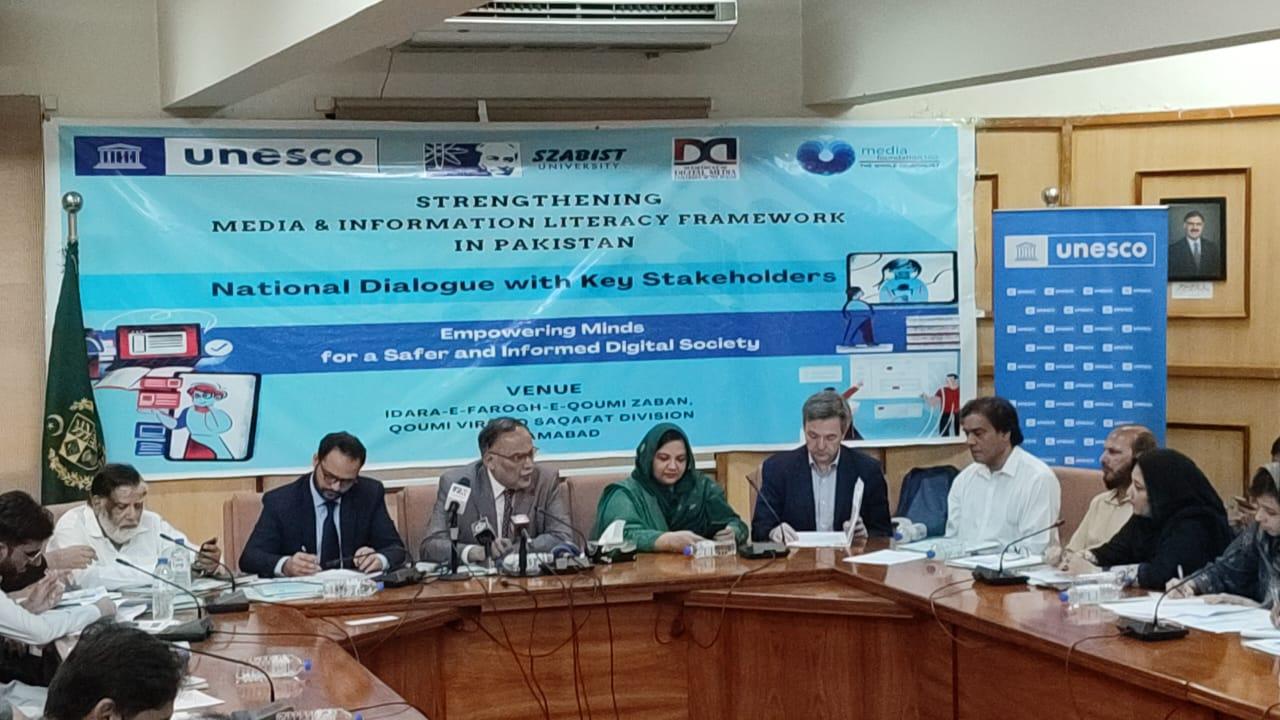Federal Minister for Planning, Development, and Special Initiatives, Prof. Ahsan Iqbal, delivered the keynote address. He underscored the urgency of addressing the growing threats of misinformation and disinformation, calling for collective efforts to counter these challenges.
Addressing the participant, he stated, “News verification is the biggest challenge of this era, and to tackle it, the government will formulate a charter for media literacy. The biggest threat to democracy is the combination of technology and information. If a presidential election in a democracy like the US can be affected by fake information, it’s a matter of concern for us. Minister further said that in the digital age, fake news is a weapon of war, and media and information literacy is the first line of defense for every country.
The Federal Minister stated that media organizations should come together and appoint an ombudsman to strictly account for those who broadcast irresponsible news. Stressing on the importance of introducing students to question the content they consume, Ahsan Iqbal said that educational institutions should consider transforming traditional methods and focus on promoting critical thinking. “I urge every Vice Chancellor to make media literacy a part of all programs in universities, regardless of the discipline students are enrolled in, so that young people can learn to distinguish between truth and falsehood.”
Highlighting the negative effects of fake news, he said, “In 2018, two political parties launched a hateful propaganda campaign against me on social media. Influenced by social media, the hatred in a young man’s mind took the form of a bullet that entered my body.” He urged the stakeholders that those who spread hatred freely on social media should face exemplary punishment.
Ahsan Iqbal concluded the keynote address expressing a commitment to present the Media and Information Literacy framework developed through this dialogue to the government for necessary action.
The event was organized by UNESCO in collaboration with Media Foundation 360, SZABIST University Islamabad, and the Department of Digital Media, University of the Punjab, as part of UNESCO’s initiative to strengthen Pakistan’s Media and Information Literacy Policy Framework at Idara Faroogh-e-Qaumi Zuban in Islamabad. UNESCO National Programme Officer, Hamza Sawati, opened the event by welcoming participants, acknowledging partner institutions, and highlighting the critical importance of developing a national MIL framework. He reaffirmed UNESCO’s ongoing commitment to promoting media literacy, critical thinking, and responsible digital engagement, especially in today’s rapidly evolving information landscape. Dr. Savera Mujib Shami, Research Lead of the project and Chairperson of the Department of Digital Media at Punjab University, presented an overview of the project.
She shared the key recommendations gathered from extensive provincial and district-level consultations held across the country. Khusro Pervaiz Khan, Head of SZABIST University Islamabad Campus, also addressed the participants, sharing his support for the initiative and underlining the role of academic institutions in shaping media-literate, critically thinking citizens. He emphasized SZABIST’s commitment to empowering students with strong media literacy and digital responsibility. Political Counsellor at the Canadian High Commission, Mr. Daniel Arsenault, also addressed the event and commended the efforts undertaken to develop the Media and Information Literacy policy framework.
The dialogue featured reflections from prominent senior media professionals Ms.Asma Shirazi, Mr. Mohammad Malick, Mr.Amir Ilyas Rana, Mr. Hamid Mir, (Former Presient PFUJ) Mr. Nawaz Raza, Mr.Faisal Zahid Malik, and Former Executive Director, Pakistan Institute for Parliamentary Services (PIPS) Mr. Zafar Ullah, President, Pakistan Federal Union of Journalists (PFUJ) Mr.Afzal Butt described the initiative as a timely and crucial step toward combating disinformation and promoting responsible media consumption. Participants highlighted the need for broader social change, including improving primary education systems and addressing the role of older generations in spreading misinformation. They also stressed the responsibility of journalists and media professionals in leading the national conversation on digital literacy and fostering informed citizenship.
The event brought together government representatives, academics, media professionals, and civil society members to discuss strategies for tackling the challenges posed by misinformation and disinformation in the country.Participants from diverse sectors including academia, media, and policymaking provided positive feedback on the event. They praised the organizers for launching such an inclusive and much-needed national dialogue. The recommendations and insights collected during the session are expected to inform the development of a comprehensive MIL policy, aimed at enhancing digital literacy, reinforcing democratic values, and building societal resilience against misinformation and disinformation.







